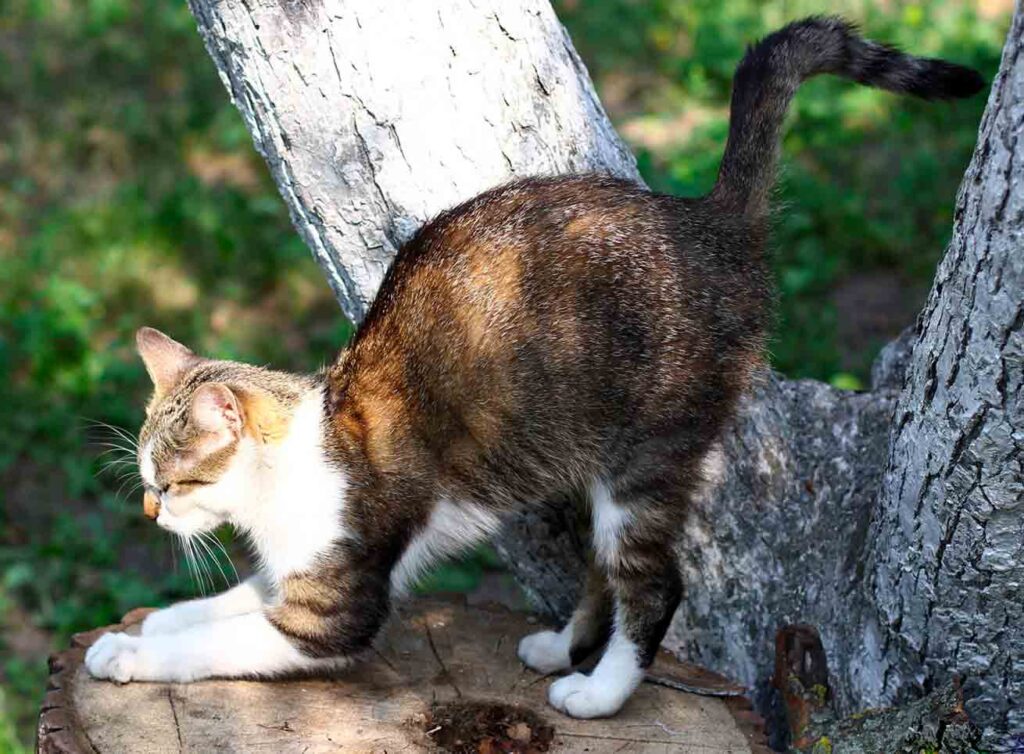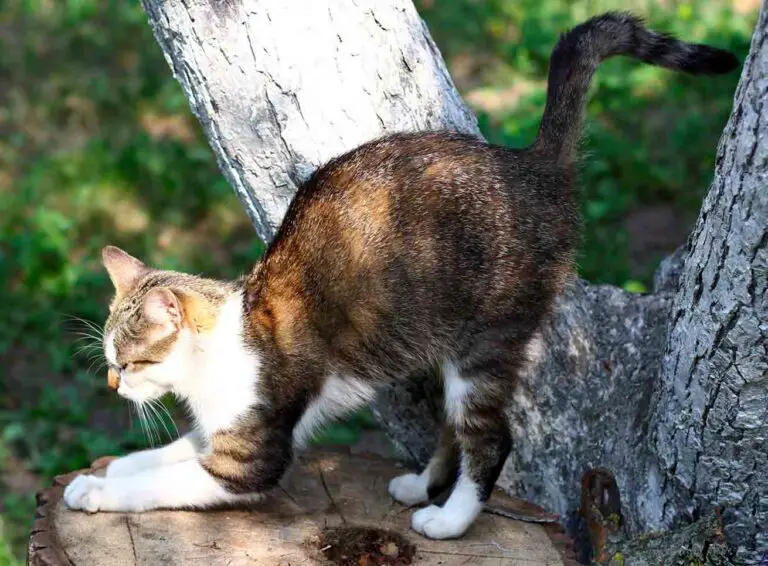Before talking about the difference between male cats spraying and female cats spraying, it’s important to note that both are trying to mark their territory. Back in the day when cats lived in the wilderness, they had to be on alert for predators so marking their territory was a way of warning others not to come any closer.
Do Male Cats Spray More Than Female Cats?
Male cats are more likely to spray than female cats, but there are other factors involved. As mentioned above, it’s important to have the cat neutered if they are not already in order to calm down their hormones which could trigger spraying. If the behavior continues after a few months even after neutering, it may be a sign of a medical problem. In these cases, consulting with a vet is advised.

Why do cats spray?
When it comes down to it, one of the main reasons why cats spray is because they are marking their territory or because they are insecure about their surroundings or themselves. Since males have a tendency to fight more often over territory than female cats do, the conclusion would be that male cats spray more than female cats.
However, there can be other factors involved such as neutering or inappropriate elimination. Neutering makes the hormones calm down, which could trigger spraying to start. Also, if cats are not neutered, they could spray because of sexual urges rather than territorial ones. If the cat has been spayed or neutered and still sprays after a few months, it may be an indication that there’s another problem going on – perhaps a medical one.
Inappropriate elimination is another cause for concern. If the cat has formed a habit of spraying in an area, they probably do it because it feels safe to them and is out of their system before anyone sees them doing it. This behavior commonly occurs when owners have been too busy with work or other responsibilities to pay enough attention to the cat.
In these cases, it’s best to contact a vet because there may be something else going on that is causing the cat to spray in the house when they have been fixed and neutered.
How do I stop a cat from spraying?
To prevent your male or female cats from spraying, provide them with a safe, quiet place of their own. Cats are very territorial in nature, so they may feel the need to mark their territory if there is no place set aside for them. Make sure that your cat has access to food, water, and a clean litter box at all times. Also, if you have more than one cat in the house, provide each with an individual space or risk them fighting.
Here are nine ways to help you reduce the behavior.
- Help her destress: Give your cat more attention to help her feel less stressed. If you have more than one cat, give each special attention so they don’t fight over your affection.
- Do not punish: When punishing is done to stop spraying in cats, it generally makes the problem worse. Your cat will become stressed when scolded and may only spray more when you are around. This increases stress, which leads to more spraying.
- Keep your cat active: A bored feline will often spray because of it. Provide your cat with at least an hour of playtime every day. This should keep them active and reduce the urge to mark their territory by spraying indoors.
- Confine her at night: When you are not able to watch your cat, confine her to a quiet room with food, water, and a litter box. You can also buy an enclosure that attaches to the inside of a door.
- Clean up accidents immediately: Cats will spray where they have previously sprayed. If you find any areas where spraying has occurred, clean them thoroughly with an enzymatic cleaner to remove the scent of urine altogether.
- Train her to use a scratching post: Provide your cat with a scratching post instead of household items like furniture and carpet. Make sure that all posts are stable and secure so they don’t tip over if your cat climbs on them. You can also rub the post with catnip to attract their attention.
- Provide places to climb: Cats may also spray due to boredom. Provide your cat with different levels of perches or scratch posts they can jump on or climb up. This is especially helpful if you have more than one cat in the house that needs its own space, like a bedroom with fewer access points for your furry friend.
- Toys can also help: If you find your cat is spraying because of boredom, try providing toys he or she can play with. This will keep him active and entertained, so they don’t spray out of boredom.
- Place vertical pee pads in her favorite spots: One solution to marking behavior is to provide a special absorbent pad in your cat’s favorite spot to mark. This will catch any urine he releases and give you a chance to clean it up before it soaks into the flooring or furniture below.
This is not a comprehensive list of ways to stop a cat from spraying but should help get you started on finding out how to stop this behavior. If the problem continues, speak to your veterinarian about how you can stop or at least reduce inappropriate urination.

How common is it for male cats to spray?
As per the website icatcare.org, In a study of 186 neutered cats, 10% of males and 5% of females engaged in urine spraying at some time. The incidence of urine spraying in a household is directly related to the density of the cat population.
Many people wonder if there are gender differences in the tendency for their male or female pet to spray. In my experience, I have observed that males are more likely to spray than females. However, there are no scientific data to back up that observation.
There is a common belief that female cats sprayed by other females can become quite violent and may ultimately take control of a household having an extensive history of inter-cat aggression. While this may occasionally be true, it does not necessarily follow that all female cats which spray are dominant. I am unaware of any data which demonstrates that to be true.
Can you stop a male cat from spraying?
According to Vetstreet.com, the simple answer is yes, you can. However, as with many other behavior problems, it depends on why they are spraying and what you plan on doing about it.
If your cat sprays indoors the first thing to do is take him/her to a vet for an exam to rule out any underlying disease or illness that may be causing this behavior.
Once you have ensured that your cat is healthy, a number of things can be done to stop a male cat from spraying indoors. The first thing I would recommend is spaying or neutering your cat. This might seem like an extreme measure but it can work wonders when dealing with spraying behavior in cats. It will not only prevent spraying from occurring but will also have a calming influence on the cat as well.
If you are not sure if your male cat is going to be spraying indoors or out, I would still recommend neutering him even if he is an inside-only cat. It can’t hurt and it may help in more ways than one. If you do have a neutered cat that starts spraying indoors, there are other things you can do.
Behavior modification is another good way to stop a male cat from spraying indoors. In order to change the behavior, your cat needs to be taught what not to do. When your cat sprays he will mark his territory by scratching the surface with his claws and then urinating on a vertical surface.
Do all unneutered male cats spray?
No. But most male cats that do spray will adjust their spraying behavior after they are neutered.
Neutering, also known as “altering” or “sterilizing,” is the term for when a male cat’s testicles are surgically removed in an effort to prevent him from breeding and reduce other undesirable behaviors.
Neutering will not stop a male cat from spraying, but it can eliminate or reduce other undesirable behaviors such as fighting and roaming.
As per ASPCA, the number of unneutered males that spray is high, but exact figures are hard to come by.
According to the Humane Society, 90 percent of unneutered male cats will develop a spraying problem.
And a survey by the American Society for the Prevention of Cruelty to Animals found that 86 percent of unneutered male cats will spray at some point in their lives.
If your male cat has started spraying even though he is neutered, this should be discussed with your veterinarian as soon as possible.
Conclusion paragraph:
It is often said that male cats spray more than female cats. However, the truth is that there are many other variables to consider when it comes to cat spraying, including age and genetics. Male or female, if your kitty starts urinating outside of their litter box you should take them in for a checkup at your local vet clinic as soon as possible!
The folks over at Animal Medical Center say they’ve seen everything from kidney disease to diabetes causing feline urine problems. If you notice any changes in your pet’s behavior like increased thirst, appetite loss, vomiting or diarrhea make sure you get them checked out by an expert today.
Similar Topics:




